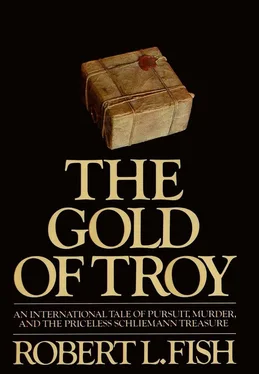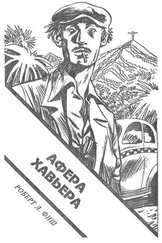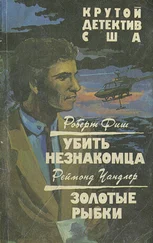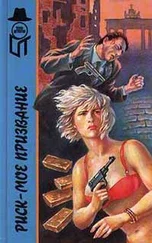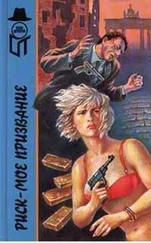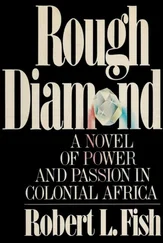Ruth was beaming. “That’s it, is right! That’s it! ”
Gregor sighed. “Darling,” he said with a patience he was far from feeling, unhappy to be contradicting her before Lindgren and the ensign but seeing no other course, “why would they blow themselves up? It doesn’t make sense. That” — he pointed to the log entry Lindgren had just read — “was probably someone running explosives or illegal arms. The chances of that having anything to do with what we’re looking for are — well, infinitesimal isn’t even the word. Impossible is the word.”
“It isn’t impossible! That’s it, I tell you! That’s our fishing boat!” She turned to Lindgren. “Axel, isn’t Gedser that little point of land just across from Warnemünde? I thought so. Gregor, darling, that’s where the train ferry docked when we were coming from Rostock here, don’t you remember? We’ll drive there tomorrow.” She smiled at the ensign. “Thank you. I don’t know how to thank you!”
The ensign blushed and tried to look as if compliments for his service were commonplace, but he knew he would remember that smile for a long time. Gregor merely shook his head in disgust. So the charade was still being played! Now that they knew they were in love with each other there was no need for excuses to be together, so why waste the time? With a shrug he nodded his thanks to the young ensign, although he would have liked to strangle the lad for being such an eager beaver and unearthing the Coast Guard log reports. As he followed Ruth and Axel Lindgren from the room he wondered which he was going to remember more once he was back in Leningrad and had only his memories to live with — the pleasure of being alone with Ruth, or the difficulty of getting to be alone with her as long as she had this mania about searching for the Schliemann treasure.
Leading the way to the car, Axel Lindgren was trying to make sense of what he had heard. It was obvious that Ruth McVeigh’s theory was that the treasure had been aboard a small boat that had exploded near Gedser. If this was true, then it had been found and somehow got into the hands of Arne Nordberg. And from those hands into his. And the fact that Kovpak acted as if he did not believe it could be a sham to keep Ruth from disclosing too much. Or Kovpak could actually not believe it. That was unimportant. What was important was that Ruth McVeigh’s idea was a very distinct possibility, and a very dangerous one for him. The count helped Ruth into the rear of the large car, waited until Gregor Kovpak had been seated, and then climbed in, taking a jump seat. Wilten closed the door behind him and got into the driver’s seat, turning at the open divider glass to look inside inquiringly.
“The Plaza Hotel,” Ruth said, and leaned back, happy.
Wilten nodded and put the car into gear. Lindgren slid the dividing glass shut and turned back to his guests.
“I really cannot allow you to hire a car for tomorrow,” he said, and smiled deprecatingly. “Wilten will be very happy to drive you to Gedser or wherever you wish. He is thoroughly familiar with the road — with all the roads in our small country, as a matter of fact. And he can even take you sight-seeing afterward, if you wish.”
“Oh, that’s not necessary,” Gregor said. “You’ve been more than kind as it is.”
“Ruth is an old friend,” Lindgren said with a smile. “I’m afraid I insist on having you use Wilten and the car! I have no plans to go anywhere tomorrow, and it would be foolish for you to hire a car. I really do insist.”
Ruth smiled. “Well, you’re being very sweet, and we appreciate your lunch and your help with the naval station, and everything else.”
“That’s what old friends are for,” Lindgren said expansively, and waited as Wilten drew up expertly before the Plaza Hotel, got out, and ran around to open the door. When they were standing in front of the hotel, Count Lindgren bent over Ruth’s hand in the gesture of a kiss, and straightened up, smiling. “The car will be here for you tomorrow whenever you wish.”
“Would nine o’clock tomorrow morning be all right?”
“Fine!”
Ruth smiled. The day had turned out to be perfect. “Thank you, Axel.”
Count Lindgren waved it away as being nothing. He waited until both Ruth and Gregor had disappeared into the hotel and then climbed into the front seat of the car beside Wilten. As the car left the hotel and started on the road back to Ringsted and Lindgren Castle, Wilten raised his eyebrows inquiringly. Lindgren nodded.
“Trouble!” he said heavily. “There’s a good possibility that Nordberg was lying to me about how and where he got the treasure.”
Wilten spoke without taking his eyes from the road. “You’re seeing him in a while. Will you put the question to him?” There was not the normal servant/master relationship in his tone of voice, nor did Lindgren seem to expect it. The two had had a long history of roguery behind them, and Wilten was willing not only to give his Caesar his due in deference before others, or even when they were alone and not involved in schemes, but he was equally willing to always remain the lesser of coconspirators. He lived better than any other valet-cum-butler-cum-chauffeur of his acquaintance, and he was well aware that his future welfare depended upon the largesse of his master. His ambition was simply to serve — and to gain thereby, and to date it had always worked. In the silence that had fallen, he repeated his query. “Will you charge the professor with lying?”
Lindgren shook his head. “He would only deny it. And for him to think I didn’t trust him, didn’t believe him, would simply put him on his guard. No, I’ll stay with my present plans.”
They drove for several moments in silence. Then Wilten said, “Will it make any great difference if Nordberg lied or not? What importance is it where the treasure came from? You have it. And it’s genuine, isn’t it?”
“Oh, it’s genuine enough,” Lindgren said. “But if Nordberg lied to me, there is a good possibility that that woman” — he jerked a thumb over his shoulder to indicate he meant Ruth McVeigh, who had just left the car — “may have a good idea of how to trace it to Nordberg.”
“But the trail will stop there, won’t it?”
“Maybe,” Lindgren said, not happy about the prospects, “or maybe not. In any event, I don’t believe in taking chances, you know that. You will be driving them tomorrow. You are to pick them both up at nine in the morning. I expect you to keep your ears open. If, by any chance at all, they get a lead that might bring them to Nordberg, and therefore be dangerous to me, I expect you will know what to do.” He turned to look at Wilten’s expressionless profile. “Do you know what I mean?”
Wilten’s frozen expression loosened enough for a faint smile. “I know what you mean” — and he added, now that the decision had been made by his superior — “sir.”
Ringsted — July
From the height of the small balcony that jutted from the wall of Lindgren Castle, Count Lindgren watched with no expression as Professor Nordberg’s car came rattling up the long drive. Five o’clock; the professor was on time for his appointment. The count watched the professor park the car and get out, immediately going to the trunk and taking from it a large bundle. Wilten appeared at once, offering help with the bulky package, but the professor could be seen shaking his head, and a moment later he had stumped from view into the castle, carrying the bundle protectively in his short arms.
Count Lindgren walked back into his den and sat down, coldly calculating. The sense of anticipation, the slight feeling of tenseness that always preceded a major act of violence on the part of the count, whether it might be the taking of a woman against her will, the facing of an adversary in a duel, rigged or not, the preparation for battle in war, was present. But Axel Lindgren knew from experience that the tenseness would disappear as soon as the deed was in motion.
Читать дальше
